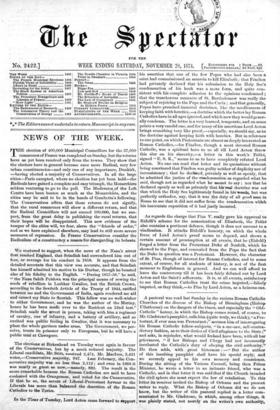In the Times of Tuesday, Lord Acton came forward to
support his assertion that one of the few Popes who had also been a saint had commissioned an assassin to kill Elizabeth ; that Fenelon had privately declared that his submission to the Holy See's condemnation of his book was a mere form, and quite con- sistent with his complete adhesion to the opinions condemned ; that the treacherous massacre of St. Bartholomew was really the subject of rejoicing to the Pope and the Curia ; and that generally, Popes have preached immoral doctrines, like the needlessness of keeping faith with heretics, —a doctrine which the better lay Roman Catholics have in all ages ignored, and which now they would gener- ally condemn. The letter is a very learned, temperate, and on some points a very candid one, and for many of his assertions Lord Acton brings something very like proof ,—especially, we should say, as to the doctrine against keeping faith with heretics. But in reference to one point, on which Protestants are almost as deeply interested as Roman Catholics,—for Fenelon, though a most devoted Roman Catholic, was a spiritual hero to us all till Lord Acton- threw this slur on his sincerity,—a letter in this week's-- Tablet, signed "E. S. K.," seems to us to have completely refuted Lord Acton. No one can read that letter and its quotations without being convinced that Fenelon was guilty neither of duplicity nor of inconsistency; that he dechtred, privately as well as openly, that he admitted the justice of the enudemnationas regarded what he said, though not as regarded what he meant to say ; nor that he declared openly as well as privately that his real doctrine was vot that which the Holy See legitimately found in his words, but was perfectly orthodox, nay, that it was the duty of all good men in Rome to see that it did not suffer from the condemnation which his inaccurate exposition of it had justly incurred.






































